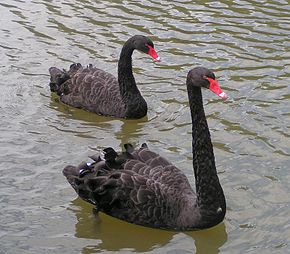
Back Vervalsbaarheid Afrikaans Falsifikation ALS ተረችነት Amharic دحوضية Arabic Falsifikasiya edilmə Azerbaijani Фалсифицируемост Bulgarian Falsabilitat Catalan بەھەڵە خستنەوە CKB Falzifikovatelnost Czech Falsifikationisme Danish

Falsifiability is a deductive standard of evaluation of scientific theories and hypotheses, introduced by the philosopher of science Karl Popper in his book The Logic of Scientific Discovery (1934).[B] A theory or hypothesis is falsifiable (or refutable) if it can be logically contradicted by an empirical test.
Popper emphasized the asymmetry created by the relation of a universal law with basic observation statements[C] and contrasted falsifiability to the intuitively similar concept of verifiability that was then current in logical positivism. He argued that the only way to verify a claim such as "All swans are white" would be if one could theoretically observe all swans,[D] which is not possible. On the other hand, the falsifiability requirement for an anomalous instance, such as the observation of a single black swan, is theoretically reasonable and sufficient to logically falsify the claim.
Popper proposed falsifiability as the cornerstone solution to both the problem of induction and the problem of demarcation. He insisted that, as a logical criterion, his falsifiability is distinct from the related concept "capacity to be proven wrong" discussed in Lakatos's falsificationism.[E][F][G] Even being a logical criterion, its purpose is to make the theory predictive and testable, and thus useful in practice.
By contrast, the Duhem–Quine thesis says that definitive experimental falsifications are impossible[1] and that no scientific hypothesis is by itself capable of making predictions, because an empirical test of the hypothesis requires one or more background assumptions.[2]
Popper's response is that falsifiability does not have the Duhem problem[H] because it is a logical criterion. Experimental research has the Duhem problem and other problems, such as the problem of induction,[I] but, according to Popper, statistical tests, which are only possible when a theory is falsifiable, can still be useful within a critical discussion.
As a key notion in the separation of science from non-science and pseudoscience, falsifiability has featured prominently in many scientific controversies and applications, even being used as legal precedent.
Cite error: There are <ref group=upper-alpha> tags or {{efn-ua}} templates on this page, but the references will not show without a {{reflist|group=upper-alpha}} template or {{notelist-ua}} template (see the help page).
- ^ Mayo 2018, Sec. 2.3.
- ^ Harding 1976, p. X.
© MMXXIII Rich X Search. We shall prevail. All rights reserved. Rich X Search